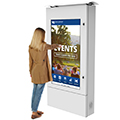Blog
Outdoor wayfinding kiosks improve tourism experiences
Interactive wayfinding kiosks allow people to navigate their sightseeing at tourist attractions. They also give local businesses exposure to tourists.

April 24, 2019 by Elliot Maras — Editor, Kiosk Marketplace & Vending Times
Outdoor wayfinding kiosks that provide up-to-date information 24 hours a day are proving to be their own best marketing tools — especially for tourist attractions.
Tracy Brown, executive director of the Blowing Rock Tourism Development Authority in Blowing Rock, North Carolina, first noticed outdoor wayfinding kiosks while attending a conference in Pinehurst, North Carolina.
"I immediately thought that it was something we could use here," Brown said. "We were looking at the best ways to keep relevant information in front of our visitors. It (the outdoor kiosk) was a way to make sure if they were looking for information they could find it."
Brown called the director of the conference facility where he first saw the kiosk and learned Meridian supplied the kiosk. Hence, Meridian, based in Aberdeen, North Carolina, was a logical choice. Beginning in April of 2017, the authority installed four outdoor wayfinding kiosks at two highly trafficked intersections, replacing static kiosks.
"We worked with Meridian to create a custom unit that fit those spaces perfectly," Brown said. "This allowed us to stay current with information with really bright displays."
The kiosks are bolted into concrete foundations to ensure security and stability. The kiosks have interactive screens on the front and 55-inch flat screens on the back to run videos showcasing the different attractions.
A benefit to local businesses
The authority allows community organizations and businesses to post information without charge, Brown said, providing that he content is relevant to the tourism industry.
"We want it to be easy for our businesses to use the platform, so we offer all that for free," he said.
The authority invested $50,000 for all four kiosks and the video screens, in addition to a $1,190 annual data management and kiosk maintenance fee, Brown said.
"It's a nice promotional outlet that we can push out information in real vivid colors. Folks enjoy using them," he said.
Brown can update the content remotely via Wi-Fi.
While the project required an investment, the kiosks also allowed the authority to reduce the visitor center staffing. The visitor center was becoming less cost-efficient as people were getting in the habit of using smartphones rather than visiting the center, Brown said. Thanks to the kiosks, the authority has been able to eliminate one position in the visitor center.
"A lot of folks are just looking for a specific activity or attraction or restaurant, and they're not looking to peruse a bunch of brochures," he said. "We saw numbers decreasing in terms of folks coming through the (visitor center) door."
Richmond County jumps on board
The Richmond County Tourism Development Authority also installed kiosks two years ago for similar reasons, said Monty Crump, city manager for Rockingham, North Carolina and acting director for the tourism authority.
"I thought, 'Why would that not work here?' There's got to be a way to get folks that information without a brochure," Crump said.
Richmond County installed 12 kiosks at highway stops as well as at tourism attractions and hotels. There are five permanently installed kiosks at outdoor sites such as tourism offices, a shopping center and a community college, in addition to indoor kiosks at restaurants and museums.
The software allows the staff to know how many people are using the kiosks, Crump said. Some kiosks get as many as 10,000 users a month.
Like Blowing Rock, the kiosks have enabled Richmond County to reduce some expenses. The authority has stopped printing brochures, Crump said.
"It's worked out very well," Crump said. "They're attended 24 hours a day; we're constantly communicating with the traveling public. You can constantly update what's on the kiosks."
Local residents also benefit
In addition to supporting tourism, Crump said local residents are using the kiosks to find locations.
"It's actually helped with our internal (community) education," he said.
"It's a phenomenal opportunity to communicate," Crump said. "They (visitors and locals alike) can spend five or 10 minutes at a kiosk and learn everything about it (an attraction)."
Richmond County is considering selling advertising on the kiosks to offset the annual $11,000 fee for copyright and support.
"I think we can generate a fair amount of that cost back," Crump said.
He did not want to say what the investment totaled, except to say it was in excess of $100,000.
Kiosks built for durability and security
Neither Blowing Rock nor Richmond County have experienced any maintenance issues with the kiosks. While the kiosks have only been in place a short amount of time, the units have been built to withstand the elements, said Melissa Tally, marketing coordinator at Meridian.
The outdoor kiosks have an enclosure with a dual stage powder-coat finish, laminated safety glass, weatherproofing and climate control. Additionally, to prevent water, smoke, and dust intrusion, the kiosks are sealed with welds, compression locks and rubber seals.
The kiosks also have high bright screens, allowing use even in the brightest direct sunlight, Tally said.
"Additionally, we use high quality Lexan laminated graphics to ensure that our outdoor kiosks are able to maintain their original appearance, despite their exposure to the elements," she said.
There are also locks to prevent unauthorized access and tampering.
Meridian's remote management software, MzeroManage, allows clients to monitor, access, analyze and deploy changes to multiple kiosks from remote locations, Tally said. Once installed, MzeroManage secures kiosks at the operating system level and enables all deployed kiosks to communicate with a cloud-based management server — providing visibility into the units.
"Utilizing this feature, clients can remotely monitor the health of their kiosks and their operating systems in real time and create custom alerts to notify themselves, or the appropriate party, when a certain aspect of a unit needs attention," Tally said. "Deployers can be notified by either email or text message if the physical unit or software has been accessed inappropriately."
The software also allows deployers to customize the severity of each alarm and to determine who an alert should go to, Tally said. If it's a tamper alarm, the alert can be sent to maintenance, but if it's a software alert, it will be sent to IT.
This Story sponsored by... | ||
|
About Elliot Maras
Elliot Maras is the editor of Kiosk Marketplace and Vending Times. He brings three decades covering unattended retail and commercial foodservice.
 ChatGPT
ChatGPT Grok
Grok Perplexity
Perplexity Claude
Claude










